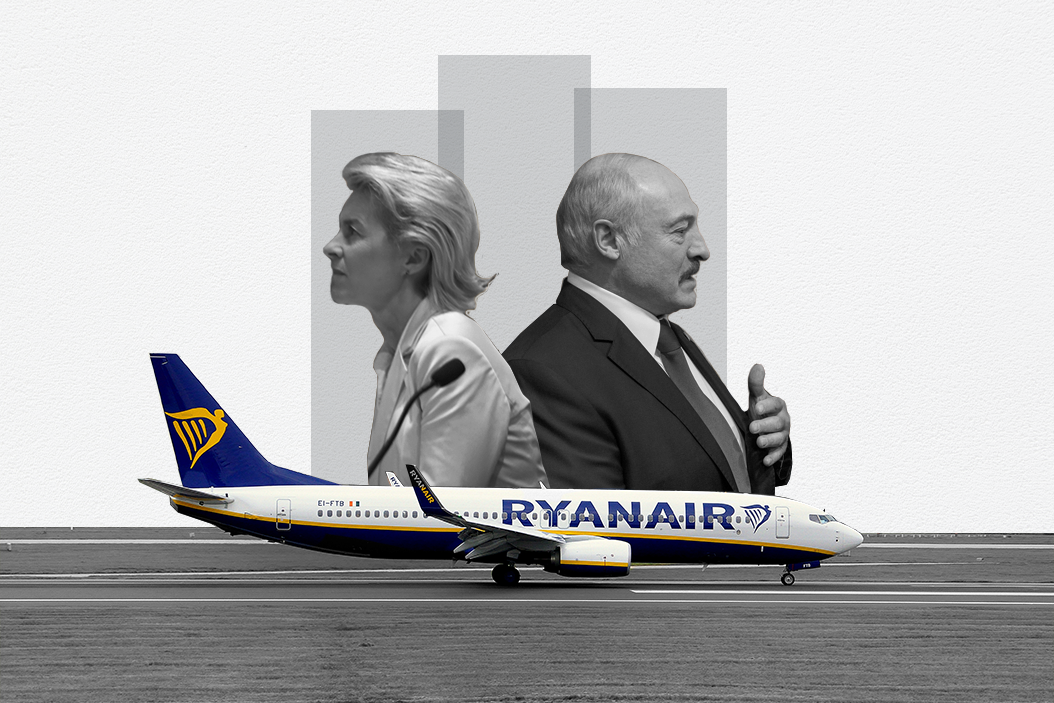May 24, 2021
The European Union on Monday agreed to sanction Belarus for having used a fighter jet and a bomb threat to ground a Vilnius-bound EU commercial airplane in order to arrest a dissident journalist. Along with the usual strongly-worded statements and in an unusually swift move, the bloc banned its sole airline from EU airspace and airports, and asked EU airlines to avoid Belarusian airspace.
Brussels also expanded current economic and travel sanctions against the regime led by strongman President Alexander Lukashenko. But tougher measures than that? Unlikely.
These garden-variety EU sanctions won't accomplish much. They will make it harder for Belarusians — including the president's cronies — to do business with and travel to the EU. But they won't persuade Lukashenko to release 26-year-old Roman Protasevich, the wanted man aboard the plane.
The founder of the independent news site Nextra is one of Lukashenko's top critics in exile. The president holds Protasevich personally responsible for (virtually) organizing mass street protests last summer, an offense that could put him behind bars for 15 years.
A calculated risk. For Lukashenko, aware that pulling off such an audacious stunt would outrage EU leaders, the benefit of silencing an influential adversary clearly outweighed the risk of triggering strong backlash in the form of sanctions, a storm he's successfully weathered in the past.
In fact, since the last time the EU imposed sanctions — in response to his crackdown on protesters and his refusal to re-run a rigged election — Lukashenko has intensified his crackdown on dissidents and the media. Just last week he passed a law that authorizes police to shoot protesters.
Why does the EU have so little leverage with Belarus? Brussels has the same problem with Minsk it has with Moscow, which we've written about before. The EU needs Russian energy to keep the lights on, and a decent amount of its imported oil and gas flows through pipelines that traverse... Belarus.
If the EU really wanted to hurt Lukashenko, it would temporarily stop buying the Russian oil and gas that Belarus collects handsome transit fees for. But the EU would then be shooting itself in the foot, not to mention that such a move — perhaps supported by France — would be fiercely opposed by Germany and Eastern European member states that rely on that route for their energy. It would also mean picking yet another fight with the more formidable Vladimir Putin.
Moreover, whether that option would be enough to get Lukashenko to back off is unlikely, given that in the past he has regularly threatened to cut off the EU from the Russian oil and gas spigot when Brussels pushed him too hard on democracy and human rights.
"Cockroach" economy. Finally, the Belarusian economy has a lot in common with Russia's, which is often compared by some economists to a cockroach: primitive in many ways, but highly resilient to pain. Its main export is potash fertilizer, which Belarus can easily sell to other countries to offset a possible EU ban. Foreign direct investment currently stands at a dismal 2 percent of GDP, so any trade restrictions arising from sanctions would have little effect.
Regardless, the EU has to do something because it can't afford the cost of inaction. Even weak sanctions will send a message, and cause enough pain for Lukashenko to think twice about hijacking an EU flight if an exiled opposition leader happens to be on the manifest.
More importantly, though, taking no action at all would show that Brussels not only pays lip service to its own commitment to the rule of law, but is also powerless to protect EU citizens from brazen acts of state-sponsored terror. And it would embolden Lukashenko to crack down even harder on those who still oppose him in Belarus and abroad.From Your Site Articles
- Putin is still winning - GZERO Media ›
- Belarus protesters vs “Psycho 3%” - GZERO Media ›
- The great Belarus deal - GZERO Media ›
- Life under dictatorship in Belarus - GZERO Media ›
- Belarus human rights abuses stacking up; Beirut blast one year later - GZERO Media ›
- Belarus human rights abuses stacking up; Beirut blast one year later - GZERO Media ›
- Belarus human rights abuses stacking up; Beirut blast one year later - GZERO Media ›
- Belarus president exploiting migrants to pressure EU on sanctions - GZERO Media ›
- Belarus foreign minister's "sudden" death drives speculation - GZERO Media ›
- Europe’s last dictator, Belarusian President Alexander Lukashenko - GZERO Media ›
- Belarusian great-grandmother Nina Baginskaya is one of Lukashenko’s fiercest critics - GZERO Media ›
- Ukraine’s fragile democracy needs help - GZERO Media ›
- Will sanctions work against Lukashenko? - GZERO Media ›
More For You
Think you know what's going on around the world? Here's your chance to prove it.
Most Popular
- YouTube
In this episode of "ask ian," Ian Bremmer breaks down two high-stakes negotiations in Geneva: Russia-Ukraine and indirect US-Iran talks, calling both “underwhelming” with little progress.
In an era when geopolitics can feel overwhelming and remote, sometimes the best messengers are made of felt and foam.
© 2025 GZERO Media. All Rights Reserved | A Eurasia Group media company.
